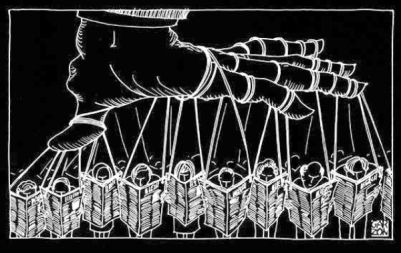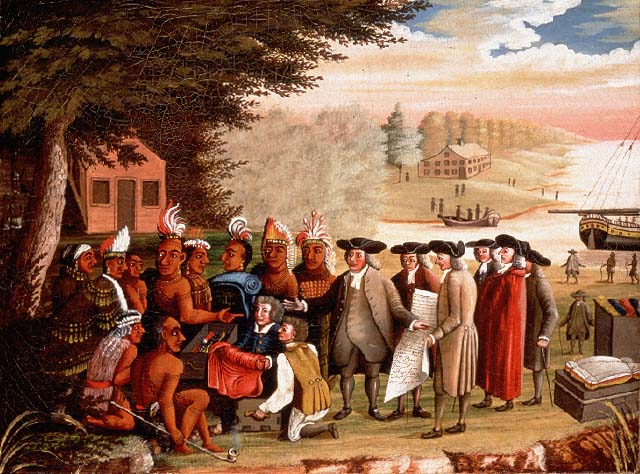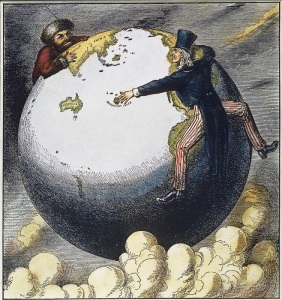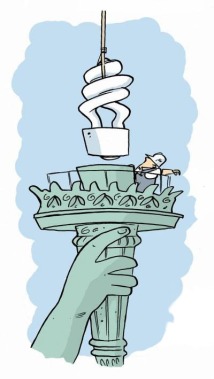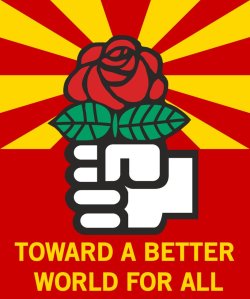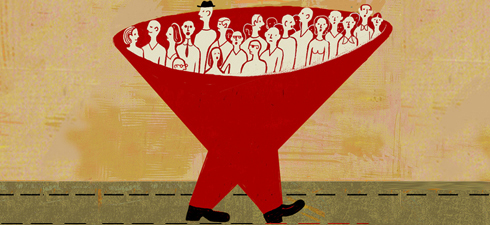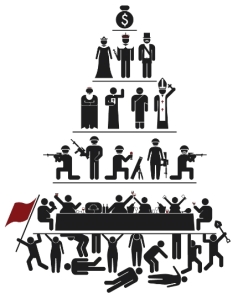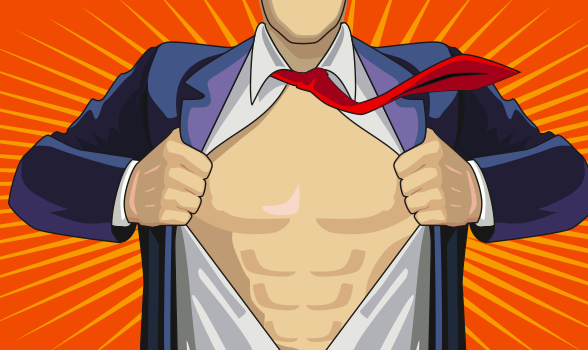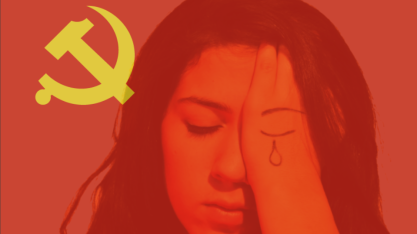
Communism is a way to organize a society, as simple as that, though the word communism is colored by many different political movements and agendas. People who grew up with ‘The Cold War’ have reactions towards Communism and get goose bumps; at the same time we see that still in several countries around the world Communism is seen as a ‘Robin Hood’ for the working class. Its opponents call Communism in its purest form an utopia and Communism as in Stalinism was a cruel version of Communism where poverty ruled for the majority.
Zsuzsanna, who grew up in Hungary under liberal Communism, still feels nostalgic about that time. Her parents grew up under Stalinism and had a harsh childhood. Hungary was the most liberal country of Eastern Europe. The communists provided everyone with guaranteed employment, good education and free healthcare and violent crime was non-existent.
In the summer Zsuzsanna went to summer camp organized by the state. Her parents worked for a state factory that made records. On Monday there was no television and was meant to spent with your family. Zsuzsanna says that education and culture were greatly understood by the government and tickets for the opera or cinema were quite affordable. She went to the Pioneers after school where they were taught how to build friendships and the importance of community. According to Zsuzsanna communist Hungary was far from being hell on earth, no bread queues or nasty tales of secret police, it was in fact a fun place to be.
Carlo who grew up in Cuba, was able to flee to the USA where he married his current wife. Life under the dictatorship of Castro was though and no one would say anything nasty about Castro while still living in Cuba. When Carlo grew up food was each month given in rations. Back then when you wanted to buy things in a store you needed US dollars, which you could only gain by asking people outside the country to send it to you. The government would take 20 cent of every dollar.
When Carlo turned 12 they he was forced to go to boarding school and only saw his family every two weeks for two days. At school he studied 5 hours, had to work four ours a day and did three hours of homework. Education and healthcare were so called free from any charge, though the Cuban people had to pay fifty per cent income taxes to receive these services. In order to be admitted in hospital and receive a hospital bed a family member had to give a blood donation.
These two stories illustrate how different life under a communist regime can be. Basically it’s all about the people who lead a country that determine how humane a system is carried out. In order to not get carried away by all the various definitions of Communism and all the various embodiments it has, we’ll stick to two of the Merriam-Webster definitions of Communism within the context of this blog post.
-
A way of organizing a society in which the government owns the things that is used to make and transport products (such as land, oil, factories, ships, etc.) and there is no privately owned property.
-
A final stage of society in Marxist theory in which the state has withered away and economic goods are distributed equitably.
James Arlandson (PhD) who teaches world religions and introductory philosophy at a college in southern California says: “Capitalism is founded on freedom, with the brakes applied to it only a little, so that it does not run out of control downhill. On the other hand, communism-turned-socialism in the US which is founded on control and restriction, with a little of the brakes released, so that it does not do more than crawl downhill.”
As Arlandson says, Communism is founded on control and restriction and has turned into for instance Socialism or even Capitalism. Today we have only five countries left in the world that are communist countries, China, North Korea, Cuba, Laos and Vietnam. There are also movements that claim that Communism has never been practiced in its purest form the way Marx had planned it. Here we speak of Marxism/Leninism, where Communism is the transitional stage in which we have social ownership of the means of production to come to a fundamental change in the economic system and society according to Marxism. The way Marx interpreted Communism is now a day referred to as Early Communism. In Ancient Greece Plato wrote in his book ‘The Republic’: “The private and individual is altogether banished from life and things which are by nature private, such as eyes and ears and hands, have become common, and in some way see and hear and act in common, and all men express praise and feel joy and sorrow on the same occasions”(Wikipedia), where the ideas of Early Communism were already formulated in a prudent and practical manner. In other words, people have always been looking for systems that would provide equality and brotherhood. It’s the practical application of such systems in day to day living that have shown us that equality in all ways has never been reached.
The question we could ask ourselves is: what have been the greatest problems for Communism to survive and become an economic and political system that would be widely welcomed and implemented?
First of all Communism has never been a free choice of the people of a country, it is forced upon them and therefore it results in many cases into dictatorship. This means that there is a repressive environment where people have not the freedom to express themselves, a large military expenditure to control the masses, misallocation of resources by restricting or denying certain foods, a heavy burden of a totalitarian regime and the absence to remove incompetent decision makers within Communism.
Due to the totalitarian superstructure of Communism the secret police becomes a resource-sucking structure that has, if we look at some of the former East European countries, half of the population as spies/informants for the secret services. People were not able to trust each other or their own government, which makes it difficult to be or become a patriot. Even concentration camps were used to repress the people in communist countries. When people are not loyal to the system they will somehow undermine that very system, such as black market activities and employee theft. People become dis-incentivised and demotivated and will not work for a regime that they spite. With no trust and fear of the dictator, Communism is like hell on earth, while it can be applied to support its people.
Dictatorship is an expensive way to lead a country, where only a few live the good life and information is restricted. Communism under a dictatorship makes it hard for regimes to discover and correct their mistakes; therefore most often incompetence goes unpunished. Improvement is almost impossible when constructive criticism isn’t possible while communist countries were to a large extend dealing with corruption and lack of transparency. Dictators do not encourage thinking outside the box and thus questioning the system equals putting your own life at risk.
Communism is wastefully using its recourses and is also known for its mismanagement. In communist countries there is no such thing as the market signaling that certain products are not in demand. Furniture for instance is made and even though the majority dislikes them and find them unpractical there is no choice since the state dictates them and determines the price. That way there is no evidence or any feedback for factories to know whether to invest in more of this furniture or make something totally different.
People applying for a job are not chosen due to their abilities; instead their political loyalty to the system is getting them into certain places on the working floor. That means that personal success is depending on political reasons and the amount of idolizing the leader, getting a job has absolutely nothing to do with being economically efficient.
The communists try to protect their economy from boom and bust cycles, though the opposite occurs and they stagnate their own economy by abolishing the market forces. They see the market in a way as evil and not as a tool to keep in touch with the outflows of an economic implemented system. When the market does not produce any incentives to innovate, the lack or inability to innovate at a large scale will eventually be the deathblow of Communism inside a country. Communism can be seen as rigid and slow to adopt to change, creativity is mostly discouraged and new ideas have to be in line with the party.
When we look at Marx’s ten measures of Communism we can see the attempt on paper to bring equality, end poverty and educate its people. In reality this has not happened in many cases, because of Communism transforming into Totalitarianism or Socialism. Looking at these ten measurements economist say that the USA today fits neatly into these measurements as well. The USA isn’t a communist state, but is getting close to resemble that which they’ve fought with their Cold War. Don’t they say, what you resist persist?
It’s time to look into solutions from a starting point of using what’s already here, we’re going to have a look at Marx’s ten measures of Communism and then see how these principles can work for us. Which doesn’t mean that we have to reinvent Communism, its more looking at a system such as the Living Income Guaranteed, and see what we’re able to use and keep that which has proven itself as effective.
1. Abolition of property in land and application of all rents of land to public purposes.
When people own their own land or property they will most likely cherish it. If the state owns all and the people feel limited by the state, they will not take care of the land and property, they will rebel and spite the state. So owning a house and some land can turn out to create more responsibility. Having too much property then necessary is asking for regulation of the hoarding of property and land, this can be done in a society where all that have not enough financial means yet may apply for a living income. So when someone has for instance tree houses and quite some land, they will not qualify for a living income and have to sustain themselves. They can sell their properties first and when they are unemployed they can qualify for a living income.
2. A heavy progressive or graduated income tax.
When we no longer see our income as a way to become wealthy, things immediately change. Which means that when our income is no longer something that can be used as a cash cow for taxes, but simply sustains your basic needs. Then where do we get the money from and thus what money do we use instead of tax money? When we no longer use taxes as redistribution and simply set a price for the use of for instance infrastructure and make it into a contribution system, then tax is no longer a personal attack but simply paid whenever and how much you use it. In other words if you make use of the economic system, you’ll proportionally contribute more to sustain it, from a starting point of having your financially basics needs met.
Maite Zamora Moreno: “If a basic income or living income is provided through non-tax funding – then the ‘pay as you go’ tax or ‘TEAL’ should be sufficient to mobilize the funds needed for other government expenditures, which we suggest would be quite limited if the economy in itself is largely corrected and empowered through the integration of the Living Income or Basic Income – then other taxes can indeed be abolished.”
3. Abolition of all rights of inheritance.
Inheritance within a society where our basic needs are met is of no need if we look at the purpose of an inheritance. It’s meant to pass on wealth within a particular family. With this wealth comes power as well and within a more humane system there is no way to control people with money when all people’s basic financial needs are met. So abolition is not necessary since inheritance will become obsolete in the end. It will be a natural process and thus no need to act as a powerful government/state that dictates people to get rid of their self-styled rights. People in general do not like change and especially change where they think they may lose things instead of gaining them.
4. Confiscation of the property of all emigrants and rebels.
When every country has its own people basic needs met, due to a new economic system such as LIG, there will not be as much movement around the globe as we see now a day. Most emigrants are economic emigrants and if they would have a decent life in the country they grew up, they most likely prefer to stay in their own country. Emigrants that like the adventure of living somewhere else and really contributing to another society are not seen as a threat but as an asset when money and jobs are no longer something to fight over.
5. Centralisation of credit in the banks of the state, by means of a national bank with state capital and an exclusive monopoly.
The nationalization of banks and digitalizing money will make banking into a management of funds. With a living income personal debt will no longer accumulate. With LIG all debt will be forgiven, banks will facilitate the building of houses and will facilitate the placement of motorcars, which are debt based on capital investments and good for economic growth. Profits will be there from a minimal interest rate and can be used to facilitate a Living Income Guaranteed. Taxes will be collected by the nationalized banking system, sales tax and value added taxes. Also here we use the principle of paying on how much one uses.
6. Centralisation of the means of communication and transport in the hands of the state.
Media should be in the hands of the people, owned by the people. We should be able to develop critical thinking, investigate certain topics and share this through media. That way we will have media that is of the people and for the people.
Transportation can be nationalized since this is a basic need for people and should not be in the hands of individuals trying to make a profit out of it. We must be able to travel from a to b and simply pay for the service, so that everyone is able to pay for these services.
7. Extension of factories and instrument of production owned by the state; the bringing into cultivation of waste land, and the improvement of the soil generally in accordance with a common plan.
There is no need to make factories/companies owned by the state. When now people have a living income and before they were not really part of the economic system, as in customers, now the amount of customers will increase and companies can make more profit. This profit can be used to better the working conditions in the factories/companies and they do not have to compulsively increasing the production. That way prices can become affordable and quality can increase. The factory/company no longer has to be a profit-making machine and employees will be happy and feel valued. Employees can even be the shareholders of that company, have a saying in the future of the company and feel more committed to the job as when they are exploited by their boss.
Using the soil for agriculture and not abusing the soil is a principle that we need to respect as long as we will be able to eat from what Mother Nature is able to give us. Respect for all our human fellows is a great start, though respect for all life should be in place if we do not want to end up as abusers.
8. Equal liability of all to work. Establishment of industrial armies, especially for agriculture.
When all people need a job we certainly have to create more jobs. The question is: are there enough reasonable and useful jobs to get an entire planet working? A lot of the current jobs will be automated within the next decade. There are currently jobs that shouldn’t be here if we all took our responsibility. And there are jobs that are not yet invented, many environmental problems need to be solved and thus need new approaches. Why should we all be working when someone if fine with earning a living income and be a responsible citizen who participates within society? Let people do the things they’re good at, create happy people.
9. Combination of agriculture with manufacturing industries; gradual abolition of all the distinction between town and country by a more equable distribution of the populace over the country.
There will be more people living in the countryside when they have a living income and do not depend on jobs in the city or they work from home. This will be a natural process where people who like the countryside go and live there for agricultural reasons or simply to live more with nature.
10. Free education for all children in public schools. Abolition of children’s factory labour in its present form. Combination of education with industrial production.
Free education is a beautiful goal and should already start with the parents before they even have their children. Knowing who you are will make it easier to guide your child through life without transferring your unprocessed issues to your child. Knowing what a child goes through and knowing that your child will always be a mirror for yourself, makes you aware of your attitude towards and around your children and children in general.
Home-schooling your children the first seven years of their lives gives you the opportunity to bond with your child and teach them their basics in a one on one setting. School after seven years of home-schooling will be an addition and a gathering of students to discover those things they would like to learn with other students of different ages. Teachers will be coaches that guide the students in their quest of finding the right knowledge and information and incorporate it in such a way that they can work with it and complete their intended purpose or project.
School should be a place that creates critical thinkers that are ready for the era they live in and not a hatchery for children that will become factory or office employees easy to manage by their bosses.
Today Communism in its purest form is hardly to be found anywhere and it is likely that it will not survive the test of time. When we look again at the word Communism, we can see that we can split it up into: come u is me. That would be a wonderful start for any new system that we can bring into life. Come and join, because you are equal to me and I am equal to you, we will care for each other and not settle for less.
Communism had its chances, its time to bring in something new, built upon the experiences and various dimensions of the old. Join us in exploring the best solutions for the best society where all of us can live our utmost potential. Investigate a Living Income Guaranteed.
Sources:
What is the Living Income Guaranteed?
http://www.americanthinker.com/articles/2005/03/the_fatal_flaw_in_communism.html
https://answers.yahoo.com/question/index?qid=20060916182449AAmzPn8
http://policyeconomics.blogspot.nl/2008/09/marxs-10-measures-of-communism.html
http://en.wikipedia.org/wiki/Communism
http://www.therichest.com/business/economy/the-five-remaining-communist-countries/?view=all
Taking notes 36: Is China communist?
http://www.dailymail.co.uk/news/article-1221064/Oppressive-grey-No-growing-communism-happiest-time-life.html
